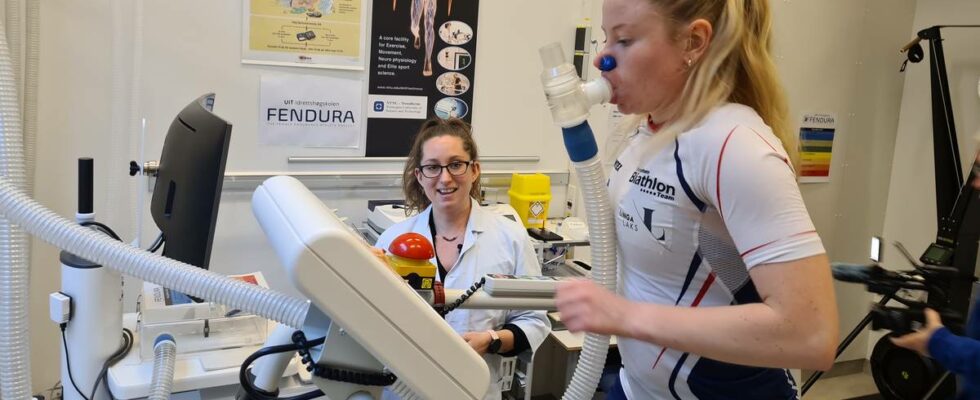Can exercise added after the menstrual cycle lead to better performance? Researchers associated with the University of Tromsø (UiT) have been trying to find out since 2020. The answer is no, they recently concluded. – There is nothing to indicate that a woman will be in more, or less shape, in a specific phase of the menstrual cycle. At least in a way that will be the same for all women, says doctoral student at UiT, Madison Taylor, to news. Doctoral scholarship holder at UiT, Madison Taylor Photo: Marte Christensen She has been mainly responsible for one of the sub-projects in the so-called Fendura project. For about two years, 80 female athletes have logged their cycle, identified which days they ovulate, and regularly had physical tests in a laboratory at various times in the cycle. Among the participants, they found no connection between the menstrual cycle and physical endurance. Thus, the result is at odds with “Superuka”, which is spreading in social media channels such as TikTok. Critical: – Misleading If you follow the “Superweek concept”, it would be appropriate to train harder around ovulation, which can be from day seven to 14 of the cycle. The concept originates from the book “Superuka”, written by Line Tiller. In recent years, she has spoken to a number of the world’s foremost experts on cycling. Taylor is surprised to see the “Super Week” trend pop up on TikTok, as there is little research to support this idea, she claims. – I think it’s misleading, says Taylor and continues: – The concept of “Superweek”, as it is presented, comes from the idea that estrogen levels increase around ovulation, which is an essential hormone for women’s reproduction, so it is logical that we expect to see performance benefits when estrogen levels are high. But when we test this in a laboratory, we don’t see the same effect. For the researchers in the Fendura project, there is more or less no connection between increased levels of estrogen and physical fitness. Hormones are also very complex, explains Taylor. – Just because there is more estrogen floating around in the body, it does not mean that your body can use more estrogen. Major weaknesses with the concept Siri Moseng, also known as the “cycling enthusiast” on Instagram and TikTok, has previously told in an interview with news that she is among those who train more explosively during the hard, good week, i.e. “Super week”. – This week it’s just to be used for what it’s worth, said senior physician at Oslo University Hospital, Guri Majak, to news. Line Tiller tells news that “Superuka” is not intended as a conclusion for all women. – The fact that for some there is a period during a month with more energy, more drive and oxygen in the muscles, due to the strong increase in the hormone oestrogen, is meant as a way of getting to know your own body, explains Tiller. If you follow the “Superweek trend”, it will therefore be appropriate to train harder around ovulation. But for most women, it will be difficult to plan your training around when you ovulate, Taylor points out. THE FENDURA PROJECT: Researchers see no connection between menstruation and physical fitness. Photo: Madison Taylor Mainly because the ovulation period will vary from woman to woman. Some have a cycle of 21 days, while others have a cycle of 35. Thus, “Super Week”, as the concept is presented, will not be between days 7-14 for the vast majority, she believes. Nor do all women ovulate, since 68 percent of all Norwegian women use contraception, argues Taylor. – Well, this is one of the major weaknesses of the concept. Because when you use hormonal contraception, in most cases, you don’t ovulate or have the hormonal fluctuations that a naturally menstruating woman has, she says and continues: – So the whole idea of exercising around ovulation will not apply to 70 percent of the female population . Tiller, for his part, wonders if Taylor has realized that many women in Norway, who use hormonal contraception, actually choose IUDs. Something that does not stop ovulation. – We shouldn’t go around thinking that those who don’t ovulate can’t have great weeks. Some of us can have a little extra super week every now and then, and that is exactly why one should learn how to track. It is no more dangerous than that, she says. I think we still have a way to go. Tiller refers to new research, which shows that sports studies in general most often conclude at a group level, not at an individual level. Line Tiller is the author of the book Superuka. Photo: Agnete Brun – In any case, it may turn out that when it comes to training, the day of the week doesn’t have much to say for the “great us”. But for some, like Tiril Eckhoff, or the American women’s soccer team, or a number of female athletes who are now in the harness before the Olympics in Paris, it seems possible to have it, she says and continues: – The problem with most sports studies, who have looked at the effects of the cycle, has been and is that both many researchers and large parts of the media would like to conclude on behalf of “all women”. It will be wrong. Tiller looks forward to following what larger quality studies around women and the cycle conclude in the future. – I don’t think either I, Madison Taylor, or many researchers out there have the answer yet, she says. It is also pointed out in the book that the use of hormonal contraception, for example birth control pills, affects the cycle and can reduce the “superpowers”. Published 24/07/2024, at 21.58
ttn-69
– Misleading – news Sport – Sports news, results and broadcasting schedule

